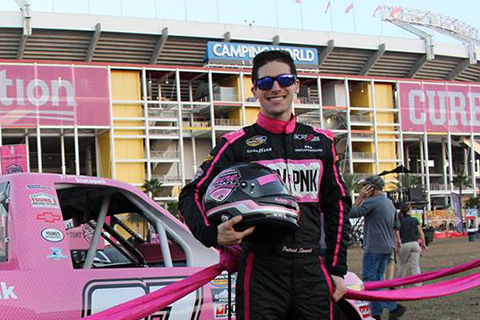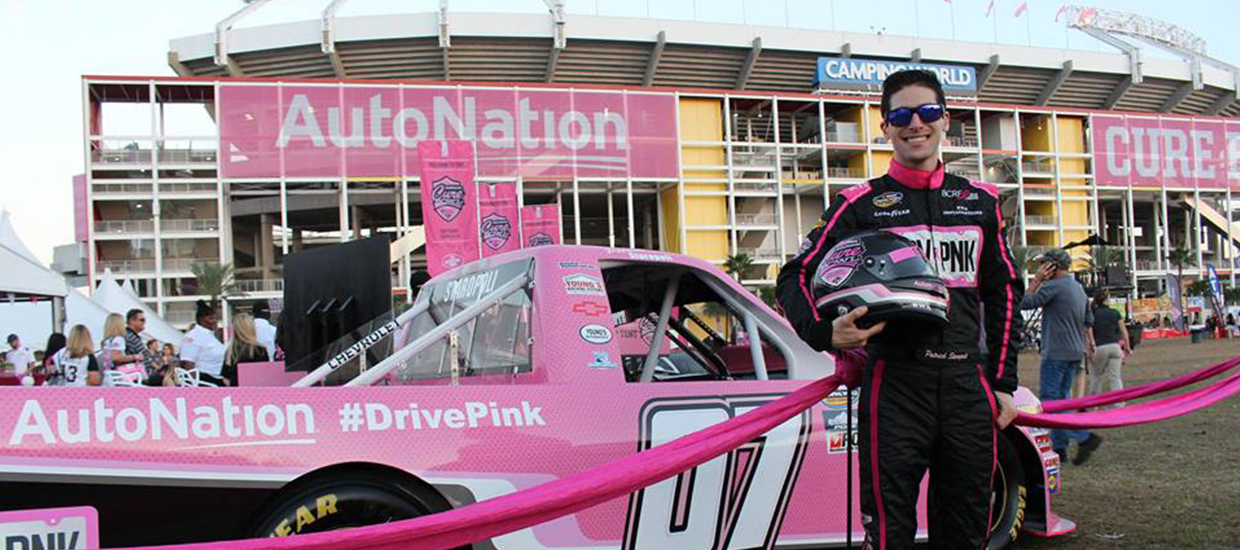Patrick Staropoli, M.D. '17, graduated from the Miller School of Medicine in May. We asked Patrick some questions about how he is finding success in both car racing and the medical profession.
You have recently graduated from the Miller School of Medicine. What’s next?
I’ll be pursuing a career in ophthalmology, and will start a residency at Bascom Palmer Eye Institute in July 2018. This year, I’ll be doing a transitional year internship at Aventura Hospital and Medical Center, rotating through medicine wards, emergency, surgery, and ICU to get a wide exposure before focusing on ophthalmology.
Why did you choose the Miller School of Medicine for your medical education?
There were a lot of factors. On my interview day, I was really impressed how this campus is the hub not only for South Florida, but also the entire Caribbean, and if I wanted to get a rigorous clinical experience, then this would be the place to be. Ophthalmology was also starting to move up my interest list at the time, and so Bascom Palmer Eye Institute was a big selling point. On top of all of that, I was excited to come back home and to learn medicine at the same hospital that saved my dad's (Nick Staropoli) life after a serious racing accident in 2001. (Thank you, Ryder Trauma Center!)
Why did you go into medicine?
I actually entered college thinking I wanted to do mechanical engineering. Many of the prerequisite classes overlapped with the pre-med classes, and I became really interested in the clinical applications of the science that we were learning. I got involved with Unite for Sight thanks to some friends - our job was to go around Boston and give free vision screenings to the underserved - and I got excited about that type of interaction. I think my dad's accident was still in the back of my mind and I started to realize that I could use all these years of school to help people. I came back from the winter break sophomore year, revamped my whole schedule from engineering to neurobiology classes, and the rest is history.
In addition to graduating from medical school, you are also a professional NASCAR driver, as your dad and grandfather were! How do you balance the many demands of both passions?
Not very well (lol). But seriously, school and racing have always been a balance. The deal my parents made with me when I first started was that I had to get straight A's in school in order to race. I took that agreement a little too literally, but it has opened so many doors - to college, medicine, and racing. Obviously, it's gotten tougher. I only raced three times in the past year, and since school has been my priority, I just need to be very efficient about getting up to speed at the racetrack and picking up my rhythm, despite the lack of practice time and how much the competition evolves in between my races. It adds another layer of difficulty that I constantly have to adapt to.
How did you get started in racing?
I went to my first race when I was six months old, watching my dad compete at nearby (now closed) Hialeah Speedway. My father and grandfather are car mechanics for a living, so I grew up around cars and learned everything I know from them. I started in go-karts when I was 13 years old, and worked my way up the regional and statewide divisions from there. My big break into NASCAR actually came after I won a reality television driver search competition during the summer of my first year of medical school. The grand prize was one race in NASCAR, and after finishing fifth in my debut earned my way to competing in 10 races over the last three years.
What’s been the highpoint of your racing career so far?
I think it would be easy to call my NASCAR win at Irwindale Speedway in 2014 the high point. That was the PEAK Challenge that gave me my first NASCAR opportunity. As a kid, that's what I dreamed about my whole life. However, hindsight being 20/20, I would still say that winning on the final night that Hialeah Speedway was open in 2005 would be the biggest win of my life, and it happened when I was only 15. This was the track I grew up at every Saturday night, where I drove my first stock car, and where my dad almost lost his life. My entire family was there, and they packed nearly 7,000 people in a facility that usually only had 200 in attendance. It meant the most to me personally.
Do you find parallels between medicine and racing?
Definitely! There's a lot that carries over as far as the teamwork needed to win a race. You have seven pit crew members who change four tires and 22 gallons of fuel in 11 seconds. That requires the same type of choreographed and almost anticipatory communication that you need on a medical team. There's also the precision and focus that are required at 200 mph with two-three G forces on your body and 120 degree temperatures inside the car - just like a surgeon needing to remain calm in the OR despite any distractions or complications. As I have progressed in school and racing, I see more of the similarities and how the skill sets can translate between the two.
What do you hope to be doing in the field of medicine ten years from now?
Ten years from now, I see myself pursuing an academic career in ophthalmology. I have had some great mentors in Ninel Z. Gregori, M.D., associate professor of clinical ophthalmology and chief of ophthalmology at Miami Veterans Affairs Medical Center, and Byron Lam, M.D., professor of ophthalmology and the Robert Z. & Nancy J. Greene Chair in Ophthalmology, who have shown me that you can balance clinical responsibilities with being a researcher and an educator. I also hope to continue racing. It is my passion and I really believe it is a powerful platform for reaching people. The last several years I have been part of the AutoNation Drive Pink campaign that has raised more than $2.2 million for the Breast Cancer Research Foundation. I'm lucky to be in a position to pursue both of my passions at a high level, and I hope to continue to use it to bring about positive change.
Is there anything else you’d like to share?
I would just say that I'm continuously impressed and in awe of how incredible my classmates are and what they have accomplished (both 2017 and my original class of 2016.) I know the racing is "cool" but the people I have met at UM are all doing incredible things, and it is a privilege to know them and call them my friends. I think my story shows that you don't have to sacrifice one dream in the pursuit of another, and you can end up with something really unique and special when you put the time, effort, and passion into making both of them happen.





